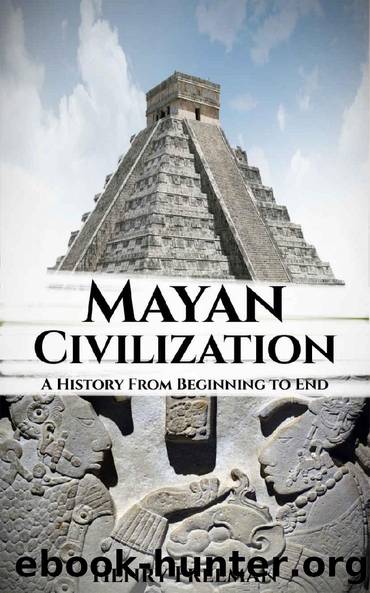Mayan Civilization: A History From Beginning to End by Henry Freeman

Author:Henry Freeman [Freeman, Henry]
Language: eng
Format: epub
Publisher: Hourly History
Published: 2016-09-25T00:00:00+00:00
Chapter Four
Larger Than Life
Plenty of people who have put some thought to the life and times of the Maya people walk away wondering about how they could accomplish so much in their environments. The Maya seemed to be able to maintain a seamless relationship between ecological resources and nature, a highly religious society governed by a divine king, and a system of power struggles. Yet, in many ways, their larger than life existence makes it no wonder that understanding of the way they lived their lives sent themselves into a death spiral. Would anyone truly continue to trust rulers and their reinforcing elite if in the face of the crises they faced? The answer, culturally, was: (1) to continue with rituals; (2) request more supply and service demanding ceremonies, and (3) to expect more moral and required support to kings geared toward having to establish might and victory in perpetual need of expansion.
The list of crises that the Maya began to face during their decline, all of which have been debated for some time, include: drought, environmental overuse and disasters, overpopulation, disruption of trade routes, excessive growth driven by elite, a restlessness that brought a general conflict to the area, peasant revolts, overpopulation, and epidemics.
To know the Maya culture is not just to rely on portrayals that elevate the Maya shaman and the Maya respect for nature above other civilizations. Sure, other civilizations have dealt with their own priorities, conflicts, and internal and external threats to their way of life, and governance policies that don't adequately address societal concerns. Is it true, like some have interpreted, that we can turn to the Maya to relearn from ancestral knowledge how to avoid disconnecting from the world around us, even though we cannot simplify their story conveniently and only notice the seemingly positive attributes of their civilization?
Although that is a question that can fill an entire book, what we can handle here is the possibility that many civilizations have had a powerful, increasingly driven elite that led to a disconnect with previously held traditions for the sake of the status-minded. Then, we may at least be honest that the Maya themselves moved away from the very knowledge that is often portrayed as uniquely Maya in origin: a connection with the sacred in everything. With further exploration, without taking away from the Maya potential for treating their ecological world with a sacredness that brought an awareness of a oneness with nature and the cosmos, that lack of separateness from nature, seeds, and a stewarded environment may have less to do with integral Maya-ness. It may have to do with indigenous designs based on living close to the land and can be seen as a shared value by many indigenous groups around the world before power and expansion ambitions drive the very system into chaos. It's a thought.
Now, their very larger than life civilization is the subject of much awe and criticism. Here we'll explore only some of it, including their architecture and manipulation
Download
This site does not store any files on its server. We only index and link to content provided by other sites. Please contact the content providers to delete copyright contents if any and email us, we'll remove relevant links or contents immediately.
| Africa | Americas |
| Arctic & Antarctica | Asia |
| Australia & Oceania | Europe |
| Middle East | Russia |
| United States | World |
| Ancient Civilizations | Military |
| Historical Study & Educational Resources |
The Daily Stoic by Holiday Ryan & Hanselman Stephen(2706)
The Fate of Rome: Climate, Disease, and the End of an Empire (The Princeton History of the Ancient World) by Kyle Harper(2434)
People of the Earth: An Introduction to World Prehistory by Dr. Brian Fagan & Nadia Durrani(2346)
Ancient Worlds by Michael Scott(2102)
Babylon's Ark by Lawrence Anthony(2069)
Foreign Devils on the Silk Road: The Search for the Lost Treasures of Central Asia by Peter Hopkirk(2055)
India's Ancient Past by R.S. Sharma(1984)
MOSES THE EGYPTIAN by Jan Assmann(1970)
The Complete Dead Sea Scrolls in English (7th Edition) (Penguin Classics) by Geza Vermes(1839)
Lost Technologies of Ancient Egypt by Christopher Dunn(1797)
The Daily Stoic by Ryan Holiday & Stephen Hanselman(1767)
The Earth Chronicles Handbook by Zecharia Sitchin(1744)
24 Hours in Ancient Rome by Philip Matyszak(1676)
Alexander the Great by Philip Freeman(1645)
Aztec by Gary Jennings(1543)
The Nine Waves of Creation by Carl Johan Calleman(1519)
Curse Tablets and Binding Spells from the Ancient World by Gager John G.;(1510)
Before Atlantis by Frank Joseph(1483)
Earthmare: The Lost Book of Wars by Cergat(1466)
